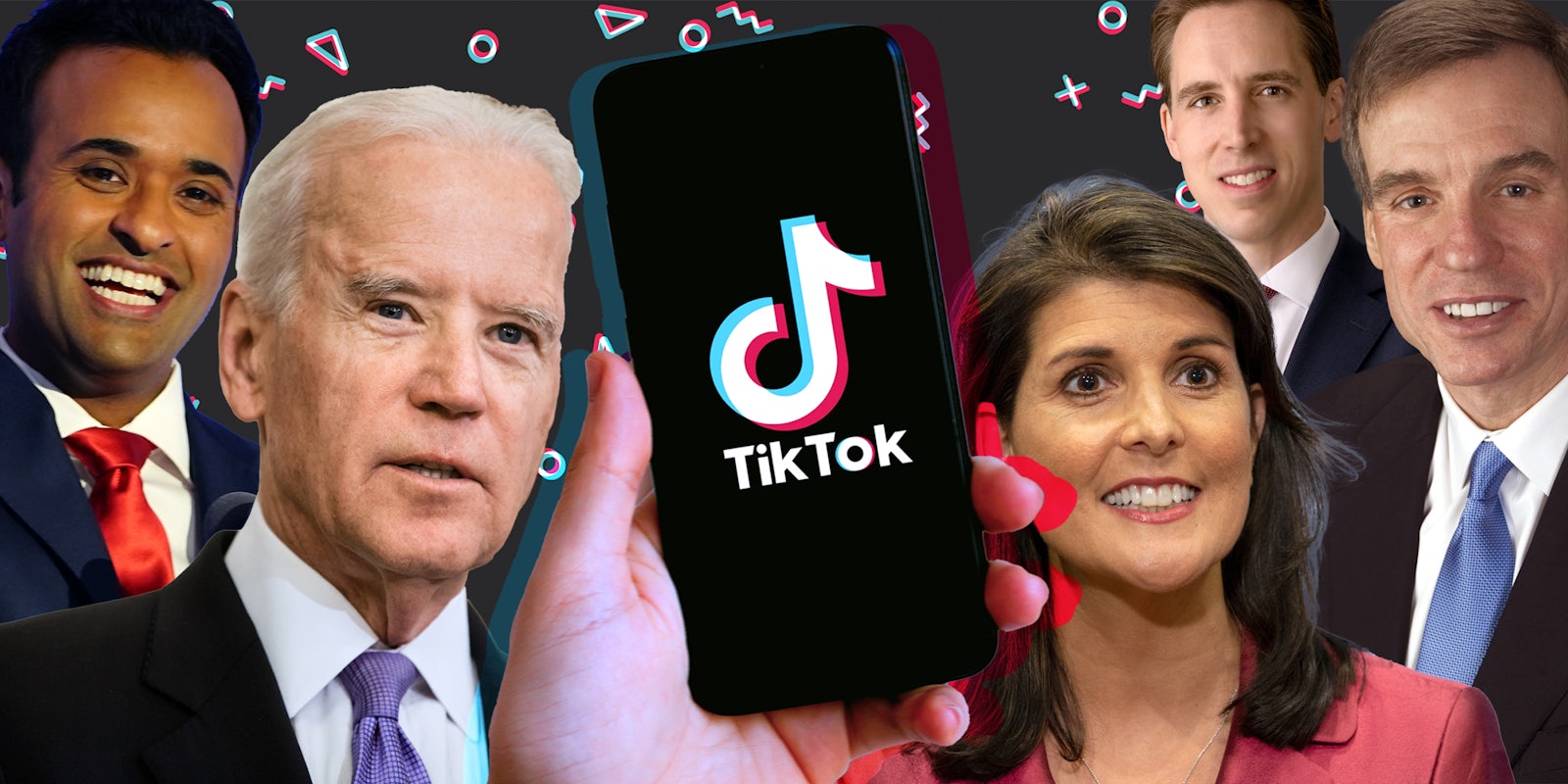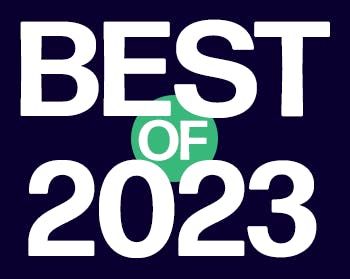TikTok, the most widely used app in the world, is also its most controversial. Widely loved by millennials and Gen Z, it’s become a boogeyman for the internet age: nefarious, problematic, addictive.
As America struggled through an actual opioid epidemic, politicians have lashed onto those fears, branding the app “digital fentanyl” as they’ve pushed again and again to remove the digital intrusion into America’s shores.
The head of the House’s Select Committee on China, Rep. Mike Gallagher (R-Wisc.), calls the social video app “highly addictive and destructive.”
Republican presidential candidate Vivek Ramaswamy, who campaigns as a fervent and unflinching champion of free speech, no matter what the alleged context, says he’s “very open to banning TikTok outright.”
“If you can’t smoke an addictive cigarette until you’re 18,” Ramaswamy said in February, “you shouldn’t be able to use an addictive social media platform by the age of 15 or 16 either.”
Senator Josh Hawley (R-Mo.) gave a long speech in the Senate warning about the dangers of the app.
“There is a reason that TikTok isn’t even available in China,” Hawley said. “Why is that? Well, it is because Beijing isn’t stupid. They know it is ‘digital’ fentanyl.’”
In 2023, the panic of TikTok reached a fevered pitch.
While not every single politician called for a ban, almost no one spoke out in favor of it, no major figure defending its use or utility as xeno- and techno-phobia metastasized into a bipartisan effort to ban it on the grounds from the reasonable to the absurd: that it was dangerous for children to join at a young age, that China might be collecting U.S. user data, that the data collected was behind an effort to brainwash young Americans into bucking decades of support for Israel.
Democrats and Republicans alike have got into the mix, with both sides of the aisle calling the app a national security threat, as well as charting out different courses to completely ban the platform.
In February, the White House issued a directive ordering that the app be purged from all federal government devices. The move was more symbolic than practical, with Reuters noting at the time that getting the app off federal government systems and devices wasn’t likely to lose the company much of its then-100 million strong user base.
But it set the precedent from the top that there was something vaguely unacceptable about the app, even as efforts to articulate what in particular the problem was lagged behind and national security justifications were draped in opacity.
The White House also backed a bill in the Senate promoted by Sen. Mark Warner (D-Va.), the chair of the Intelligence Committee, called the RESTRICT Act. That bill has bipartisan support and would give the president some tools to ban the app unilaterally—as well as technology from other countries the United States deems to be its official enemies—but has reportedly slowed down over Republicans not wanting to grant those powers to Biden.
The White House also explored forcing a sale of TikTok to an American company, a process initiated under the Trump administration that carried over to the Democratic-run Biden White House.
In August 2020, Trump declared TikTok a national emergency as a pretext to force a sale, but in September of the same year, a federal court knocked down the proclamation and said the administration may have overreached its authority.
With a complex snarl of byzantine and overlapping laws to navigate at the federal level, states have gotten into the act by passing their own measures to fully ban the app. In May, Montana Gov. Greg Gianforte (R) signed a state bill that would impose a $10,000 fine on any app store that allows Montanans to download the app. After the initial $10,000 fine, penalties would stack up, $10,000 a day for app stores that weren’t in compliance.
But at the beginning of December, a federal judge struck a blow against the Montana law by finding that it violated the First Amendment. That created a precedent that any federal attempt to ban the app could be swiftly rejected, Politico reported.
A joint statement by the ACLU, the ACLU of Montana, and the Electronic Frontier Foundation (EFF) said Montana law “violates the First Amendment, plain and simple, and the court was right to block it,” calling it an attempt at “mass censorship,” and a “sweeping ban on free expression.”
But it didn’t halt the effort to restrict access. TikTok bans swept the U.S. the past year, with the federal and state-led moves just the tip of the iceberg. Universities across the country banned the app on their wifi networks. In April, Florida’s public university system revoked access to the app, putting the Sunshine State among the eleven states that have banned the app on their networks.
In June, the Defense Department updated rules that ban TikTok from DOD-connected devices, including those used by contractors. In late 2019 and early 2020, the Navy and the Army both banned the app from government-issued phones, calling it a “cyber threat.”
Utah also passed a bill in March mandating that social media companies verify that their users are over 18 before they can open an account, and if they aren’t, to get the consent of a parent or guardian to do so, reported Deseret News.
At schools, the bans have been chalked up to claims of the highly addictive nature of the app as well as data privacy concerns. In the case of Florida, the Florida Board of Governors cited national security risks and also banned tech from other Chinese, as well as Russian companies.
The idea that TikTok itself is addictive is disputed, with a July 2023 report by the French Senate finding that there are practically no scientific studies on the psychological consequences of TikTok. However, a July 2023 paper published in Psychiatry Research found that addictive users of short-video applications like TikTok had worse mental health conditions than moderate and non-users, including “higher levels of depression, anxiety, stress, loneliness, social anxiety, attention problems, and lower life satisfaction and sleep quality.”
TikTok disputes the idea that there are security concerns from the app, dismissing claims that it serves as a Chinese Communist surveillance tool. That idea has driven much of the government action on limiting access to the app.
TikTok has always claimed that “data for our U.S. users is stored on servers in the United States, and U.S.-based personnel manage access to that data and the algorithms that determine your For You feed.”
Reporting, however, has shown otherwise.
A study by the nonpartisan Congressional Research Service released in September found that there are currently at least six bills moving through Congress trying to ban the app in different ways.
One of the concerns cited in the report by lawmakers was whether to include specific language singling out TikTok in the attempted bans, which may run afoul of the Montana ruling. On the Senate Commerce Committee, Sen. Maria Cantwell (D-Wash.) is reportedly writing a bill to combat “foreign adversary tech.”
“Crafting legislation that can withstand court scrutiny is one of Sen. Cantwell’s primary goals,” Tricia Enright, a spokesperson for Cantwell, told Politico.
But while the movement in 2023 was akin to what happened in 2022, when the push took off, a new shift came about in the fall that supercharged the movement to ban the app.
Since the Oct. 7 Hamas attack on Israel, which killed around 1,200 soldiers and civilians and launched a new phase in the Israel-Palestine war, TikTok has also become a flashpoint in the domestic culture wars over responses to the war.
Young people broadly disapprove of the Biden administration’s handling of the conflict. But instead of introspection on their policies, lawmakers and politicians have cited TikTok’s role in disseminating information about the war as a cause.
At the Republican presidential primary debate last week, Former South Carolina Gov. Nikki Haley claimed bizarrely that every 30 minutes a user spent on TikTok made them “17% more anti-semitic, more pro-Hamas.”
In November, Rep. Gallagher cited a mid-October Harvard/Harris poll which claimed that a majority of 18-24-year-olds believed that “the Hamas killing of 1,200 Israeli civilians in Israel can be justified by the grievances of the Palestinians.”
Gallagher went on to blame those figures on … you guessed it, TikTok, and its alleged control by the Chinese Communist Party.
“How did we reach a point where a majority of young Americans hold such a morally bankrupt view of the world? Where many young Americans were rooting for terrorists who had kidnapped American citizens—and against a key American ally? Where were they getting the raw news to inform this upside-down worldview? The short answer is … TikTok.”
TikTok pushed back on that idea, putting out a statement arguing that the reason for the uptick in pro-Palestine hashtags on their platform was simply because young people have been expressing higher level of support for Palestine as far back as 2010, and that young people are the main user base for the platform.
It also pointed out that on Facebook and Instagram, there’s a similar lopsided ratio of pro-Palestine to pro-Israel hashtags on the platform.
But despite all the efforts to ban the app, support for TikTok, which now has 150 million users in the U.S., has increased over the past year.
A new PEW poll found that in March 50% of adults supported banning the app. Today, just 38% do. Among teenagers, only 18% say the app should be banned.
But that opinion, widespread as it is, isn’t held by the people in charge, making 2024 another fraught year for the app.
Additional photo credits:
United States Senate/Wikipedia
Rebecca Hammel / Wikipedia




